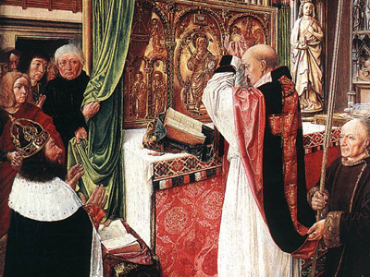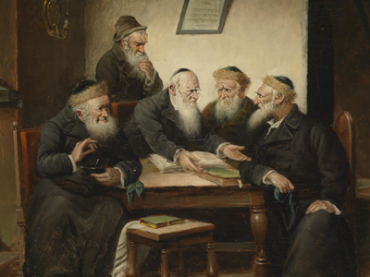Religion
Thomas of Edessa on the Nativity of the Lord
Edited and Translated by Simon Joseph Carr
Series: Syriac Studies Library 79
ISBN: 978-1-61719-169-5
This volume contains the Syriac text of sixth-century Church of the East author Thomas of Edessa’s On the Nativity, along with a Latin translation and a brief introduction in English.
$153.00
Poems of Gregory Barhebraeus
Edited with an Introduction by Augustinus Scebabi
Series: Syriac Studies Library 81
ISBN: 978-1-61719-171-8
Scebabi here presents in vocalized Serto script a number of poems penned by the famous and prolific Barhebraeus (1225-1286) together with a Syriac-Arabic-Latin glossary of difficult words found in the poems.
$152.00
Severi Philalethes
Edited and Translated by A. Sanda
Series: Syriac Studies Library 82
ISBN: 978-1-61719-172-5
The Philalethes of Severus of Antioch (d. 538) is one of the most important documents of anti-Chalcedonian christological writing. This volume contains the Syriac text, a Latin translation, and a brief introduction.
$182.00
Opuscula Monophysitica Ioannis Philoponi
Edited and Translated by A. Sanda
Series: Syriac Studies Library 83
ISBN: 978-1-61719-173-2
The Philalethes of Severus of Antioch (d. 538) is one of the most important documents of anti-Chalcedonian christological writing. This volume contains the Syriac text, a Latin translation, and a brief introduction.
$192.00
Severi Antiiulianistica
Edited and Translated by A. Sanda
Series: Syriac Studies Library 84
ISBN: 978-1-61719-174-9
This volume contains the Syriac version, with Latin translation, of Severus’ polemical work against Julian, bishop of Halicarnassus, especially on the question of the corruptibility of Jesus’ body.
$222.00
Le livre des lois des pays
Texts syriaque et traduction française avec une introduction et de nombreuses notes
Edited and Translated by F. Nau
Series: Syriac Studies Library 86
ISBN: 978-1-61719-176-3
The text published here is the Book of the Laws of Countries, a dialogue in which Bardaisan plays the major role. Nau gives this fascinating text in Syriac (Estrangela) and a French translation along with explanatory notes.
$149.00
The Separation of the Monophysites
By W. A. Wigram
Series: Syriac Studies Library 93
ISBN: 978-1-61719-185-5
This is a history of the so-called "Monophysite" schism from the Council of Chalcedon to the Muslim conquest.
$141.00
The Palestinian Version of the Holy Scriptures
Edited and Translated by George Henry Gwilliam; In Collaboration With Ernest Nathaniel Bennett
Series: Analecta Gorgiana 528
ISBN: 978-1-61719-186-2
This work consists of five leaves of the old Syriac version of the Bible, in the Palestinian dialect. Included are images of some of the leaves, Syriac text, English translation, notes, and a essay on the underlying Greek text.
$46.00
Studies in Jewish Liturgy
Based on a Unique Manuscript entitled Seder Hibbur Berakot
Edited with an Introduction by Abraham I. Schechter
Series: Kiraz Jewish Studies Archive 9
ISBN: 978-1-61719-187-9
A unique copy of the Seder Hibbur Berakot , this edition includes 22 prayers, characteristic of the Italian Jewish liturgical tradition.
$122.00
An Outline for the Study of Dervishism
Covering Six Elementary Lectures on the Popular Development of Sufism or Mohammedan Mysticism
By George Swan
Series: Analecta Gorgiana 529
ISBN: 978-1-61719-190-9
This volume is a compilation of notes from six lectures on the development and nature of Sufism.
$39.00
A Character Sketch of the Promised Messiah
Being an Epistle of Hazrat Maulvi Abdul Karim to the Members of the Ahmadiyya Community
Series: Analecta Gorgiana 532
ISBN: 978-1-61719-193-0
The life, sayings, and character of Hazrat Mirza Ghulam Ahmad, founder of the Ahmadi movement, which were written during his lifetime in Urdu by a close follower are documented here.
$50.00
Early Christian Mystics
Woodbrooke Studies 7
Edited and Translated by Alphonse Mingana
Series: Syriac Studies Library 97
ISBN: 978-1-61719-196-1
This volume contains the Syriac texts and annotated English translations of mystical treatises from five authors of the Church of the East belonging to the 7th and 8th centuries.
$194.00
The Book of the Priesthood
The First Homily on the Priesthood attributed to John Maron
Edited and Translated by Joseph Hubeika
Series: Syriac Studies Library 100
ISBN: 978-1-61719-201-2
Joseph Hubeika (1878-1944) here presents the Syriac text and Arabic translation of a long work on the priesthood attributed to Yuhanon Maron, but in fact from the hand of John of Dara.
$212.00
De S. Isaaci Ninivitae Vita, Scriptis et Doctrina
Accedunt Isaaci Tres Integri Sermones
Series: Syriac Studies Library 101
ISBN: 978-1-61719-202-9
In this volume, Chabot is concerned with the life and work of the widely influential Church of the East author Isaac of Nineveh (late 7th cent.). Three sermons, in Syriac and Latin, conclude the work.
$162.00
L’école d’Édesse
By E.R. Hayes
Series: Syriac Studies Library 103
ISBN: 978-1-61719-204-3
In this work, the author’s doctoral thesis, Hayes looks at the “school” very broadly in general terms of the Christian intellectual and theological milieu of the city.
$194.00
Les lettres d’Afrahat le sage de la Perse
Étudiées au point de vue de l’histoire et de la doctrine
Series: Syriac Studies Library 104
ISBN: 978-1-61719-205-0
This volume, the author’s doctoral thesis, contains a detailed but concise study of Aphrahat’s Demonstrations. The main part of the book is divided into two parts: the Church in Persia, and doctrine in the Demonstrations.
$158.00
Syri Orientales, seu Chaldaei, Nestoriani et Romanorum Pontificum Primatus
Commentatio Historico-philologico-theologica
Series: Syriac Studies Library 105
ISBN: 978-1-61719-206-7
Khayyath, Chaldean archbishop of Amid, here explores the literary testimonies of writers in Syriac and Arabic from the Church of the East on the question of the primacy of the Roman pontiff.
$174.00
The Life and Works of Severus of Antioch in the Coptic and Copto-Arabic Tradition
Texts and Commentaries
Series: Gorgias Eastern Christian Studies 28
ISBN: 978-1-61719-738-3
Severus of Antioch is by far the most prolific and well known theologian of the non-Chalcedonian churches. Although his life and writings came to our knowledge in Syriac, gaining him the title “Crown of the Syriac Literature,” many texts relating to his life and works survived in the Coptic and Copto-Arabic tradition, as well as a number of other texts that were traditionally attributed to him. This book provides an analysis of these texts as well as a discussion of the veneration of Severus of Antioch in the Coptic Church.
$223.00
Das Gedicht Teqqaf l’Arestotalis
Edited and Translated by Salomon Samuel
Series: Analecta Gorgiana 636
ISBN: 978-1-61719-585-3
This work, the author’s dissertation, has for its subject a unique didactic Syriac poem (301 lines) on philosophy, particularly of the Aristotelian variety, and wisdom generally. After introducing the text, the author gives a critical edition with German translation.
$42.00
De Philosophia Peripatetica apud Syros Commentatio Historica
By Ernest Renan
Series: Analecta Gorgiana 637
ISBN: 978-1-61719-586-0
Renan (1823-1892) here gives a study of Aristotelian philosophy among both east Syriac and west Syriac schools at different times and in different centers, including Syriac texts as paving the way for the Arabic reception of Greek philosophy.
$49.00
Conference upon Missionary Work for the Mohammedans
Compiled by Foreign Missions Conference of North America
Series: Analecta Gorgiana 533
ISBN: 978-1-61719-207-4
This volume contains proceedings of a conference on whether and how to attempt to convert the Muslim world to Christianity, held during the First Balkan War
$44.00
Memorial Services
Extracted by Permission from "A Prayer Book Revised" as issued in 1913
Compiled by Alcuin Club
Series: Analecta Gorgiana 536
ISBN: 978-1-61719-210-4
This part of the proposed revision of the Book of Common Prayer in 1913 contains a Quire Service, a Dirge, a Commemoration Service, and a form of Holy Communion for use at funerals.
$37.00
The Apocryphal New Testament
Attributed in the First Four Centuries to Jesus Christ, his Apostles and their Companions, and not included in the New Testament by its Compilers, Translated from the Original Tongues and now First Collected into One Volume
Compiled by William Hone; Translated by Jeremiah Jones
ISBN: 978-1-61719-219-7
Collected by the radical journalist William Hone, this collection is of the Greek New Testament Apocrypha and other first century writings.
$151.00
System of Christian Theology
By Henry Boynton Smith; Edited by William S. Karr
Series: Kiraz Theological Archive 56
ISBN: 978-1-61719-227-2
Henry Boynton Smith presents a complete manual of Christian theology from the perspective of an anti-Unitarian Congregationalist.
$241.00
Bardesanes Gnosticus Syrorum Primus Hymnologus
Commentatio Historico-Theologica
By August Hahn
Series: Syriac Studies Library 108
ISBN: 978-1-61719-230-2
August Hahn (1792-1863) here presents an early study of the famous marginal figure of early Christianity, Bardaisan. As is evident from the title of the book, Hahn is most concerned with Bardaisan as a hymnographer and a gnostic.
$150.00
Filter by
Filter by price
Filter by manufacturer



























